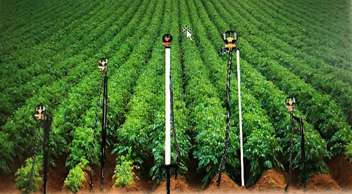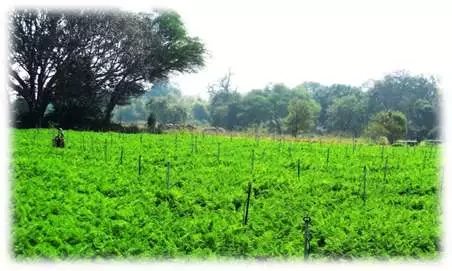
Overview:
Vegetable crops have shallow root zones, need light and frequent irrigation of 3-5 mm/day depending upon the stage of crop. There are vegetables whose seedlings are grown in nursery and later transplanted in fields, and for other vegetables the seeds are sown directly in the field and allowed to germinate. For germination of seeds, the soil temperature is very important and 20-24 Deg. C temperature is considered good for germination which can be maintained by micro sprinkler. For vegetative growth of plant, micro climatic conditions are very important where ambient temperature & humidity play a vital role. Vegetables with different spacing are grown using different cultivation practices like on beds, ridges and randomly.
Read more: Automatic Irrigation Systems – New technology awareness and its benefits to farmers
Vegetables Suitable Under Overhead Micro Sprinkler:
Onion, Garlic, Potatoes, Carrots, Cauliflowers, Cabbage, Green Peas, Spinach, Lettuce, Coriander, Green Chilies, Radish, Turnip, Sweet Potatoes, Ginger and other Leafy Vegetables.
Features of Overhead Micro Sprinkler System:
- Permanent system during crop growth and can be easily retrieved during harvesting.
- Micro sprinkler system ensures uniform application and percolation of water in soil.
- Gives light and frequent irrigation (3-5 mm/hr).
- Operates at low pressure (1-1.5 kg/cm2).
- Installation spacing is 3m X 3m to 5m X 5m irrespective of crop spacing.
- Effective solution for small farmers.
Read more: How to increase your yield of the crop using sprinklers?
Agro-technical advantages:
- Helps in maintaining optimum soil aeration.
- Allows soil temperature control during the germination stage which results in perfect germination as the ground water temperature is maintained between 18-20 Deg. C.
- Creates micro climatic conditions which helps in plant establishment and its vegetative growth.
- Foliar application of fertilizers.
- Micro Sprinkler washes leaves at regular interval which allows better photosynthesis resulting good yield and quality produce.
- Helps in Frost Protection.
Other Advantages:
- Low filtration as compared to Drip Irrigation.
- Saving on land levelling and channel formation cost.
- Micro sprinkler has flexible system, whose configuration can be changed just by changing nozzles and rotors.
- Handling and storage of less quantities of laterals as compared to drip irrigation.






